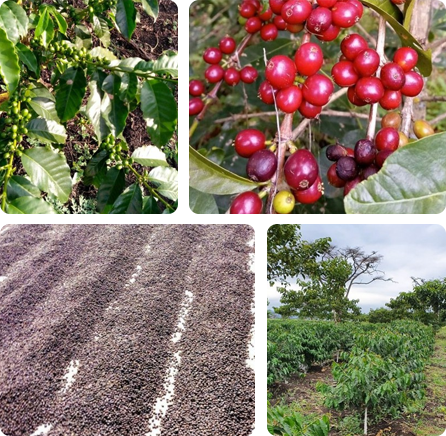Gelana Gesha.

Another main farm of Kerchanshe is the Gelana Gesha coffee farm covering 1.5 hectares of coffee cultivation under the Greenhouse technique. In this greenhouse, every agronomic practice is computer controlled using smart techniques. This is to guarantee uniform growth for our coffee seedlings.
Arabica coffee seedling is planted with a spacing of 8ft by 8ft, between each of sapling is 2 feet long x 2 feet wide x 2 feet deep pits. While digging each pit the topsoil is heaped on one side and the bottom soil on the other. The manure is added to each heap separately and filled back into the hole. This can be cow dung, poultry droppings mixed with soil or composite manure, and parchment of coffee. The center of the hole is marked and left for 2-3 months before planting. The coffee seedlings are nurtured under the greenhouse inside certified coffee nurseries.
During planting season, the saplings are planted very early in the morning or late in the evening. Temporary shades are provided to the newly planted saplings and water in the case of water-stressed areas. We believe that shade trees are extremely important in coffee farming. With their umbrella-shaped canopies providing shade to the coffee plants, shade trees help to mitigate excessive temperatures and heat stress that is responsible for flower and fruit abortion.
Shade trees provide other benefits too. We use deep-rooted shade trees to recover soil nutrients from deeper soil horizons and transport them to their leaves. When the leaves fall and rot, they provide organic matter or manure which is released to the coffee plantation. This organic matter in turn improves the soil texture and water retention thus availing the much-needed water to the coffee.
Besides, deep-rooted trees don’t compete with the coffee for water and other nutrients. Also, shade trees of the leguminous species capture much needed Nitrogen from the atmosphere and convert it into nitrates which are used by the coffee for numerous purposes. Shade trees act as windbreakers to protect the coffee trees from excessive and destructive winds and some even repel dangerous pests found in the environment. Gelana Gesha farm is irrigated by drip irrigation and sprinklers using water from the Gelana river.
When the coffee plantlets have attained a height of about 11/2 foot or 6 – 9 months after planting, they are bent in an east to west direction i.e. sunrise to sunset direction to initiate multiple branches. Two of the lowest and healthy branches are selected and maintained together with the original plantlet to ensure higher yield and profitability per tree.
Continuous de-suckering of the coffee plants is practiced in our farm to prevent the development of a microclimate that encourages pests and different coffee diseases. Soil is tested to ascertain nutrient composition and thus establish missing soil requirements. If the soil reports a low PH level, we raise it. Post harvesting our agronomist takes another soil nutrient analysis.
Only the red-ripe cherry is harvested, and they are dried immediately on tarpaulins, raised platforms, or cemented floor to preserve its good quality.
| Closest Town | Yirgacheffe |
|---|---|
| Altitude | 1400-1800 masl |
| Farm Size | 750 hectares |
| Varieties | Arabica traveller |
| Irrigation System | Drip Irrigation & sprinkler |
| Soil Composition | Fertile, deep sandy loam |
| Humidity | 55%-70% |
| Flavour | The brewed cup is distinguished by its well-balanced body (mouth feel) and noticeable spicy flavours, often fruit-toned, pleasantly sweet and vibrant with floral overtones and Long after taste like Lemon grass. |
| Body | Medium to Full body |
| Acidity | Medium to Medium Pointed or Sharp Pointed |
| Raw | Small to medium sized bean, greenish, grayish in colour |
| Harvest Period | October - December |
| Export Grade | Gr. 1, 2RFA, fair trade and ORG Washed. Gr. 1, 2 RFA, fair trade and ORG Natural. |
| Processing Method | Washed, Natural |
| Approximate Number of Trees Planted per hectare | 5000 |
| Approx. Annual Production | 3,750,000kg/Red cherry |


